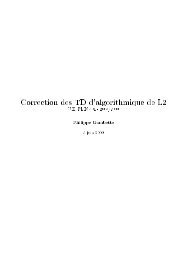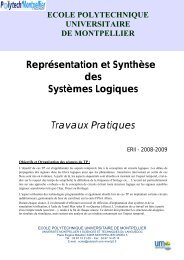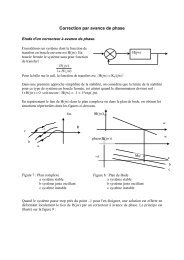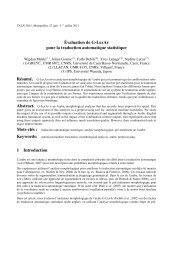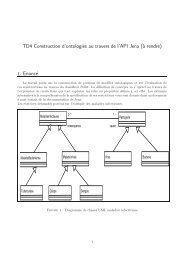Evaluating User Experience in Games: Concepts and Methods - Lirmm
Evaluating User Experience in Games: Concepts and Methods - Lirmm
Evaluating User Experience in Games: Concepts and Methods - Lirmm
You also want an ePaper? Increase the reach of your titles
YUMPU automatically turns print PDFs into web optimized ePapers that Google loves.
102 P. Lemay <strong>and</strong> M. Maheux-Lessard<br />
were even more critical, their attitude toward games be<strong>in</strong>g that such activity is<br />
thought-destroy<strong>in</strong>g. This is rather harsh <strong>and</strong> probably expla<strong>in</strong>s their reluctance to<br />
engage <strong>in</strong> this k<strong>in</strong>d of activity. Other results show that on the affective side, players<br />
feel that games are motivat<strong>in</strong>g <strong>and</strong> attractive (that’s why they perform such activity),<br />
whereas non-players do not have any feel<strong>in</strong>g toward games. While players f<strong>in</strong>d this<br />
leisure excit<strong>in</strong>g <strong>and</strong> pleasant (thus hav<strong>in</strong>g close relationships with flow experiences,<br />
e.g., Csikszentmihalyi 1990), non-players see games as stressful <strong>and</strong> difficult, thus<br />
po<strong>in</strong>t<strong>in</strong>g to anxiety experiences accord<strong>in</strong>g to the flow model. Another result worthy<br />
to mention is the fact that non-players perceive games as costly, add<strong>in</strong>g another<br />
reason why they do not engage <strong>in</strong> games.<br />
6.4 Discussion<br />
6.4.1 Discussion of the Results<br />
The gathered data prove to be rich <strong>in</strong> <strong>in</strong>formation <strong>and</strong> suggest various thoughtful<br />
avenues to <strong>in</strong>vestigate. How do we expla<strong>in</strong> differences <strong>in</strong> attitudes toward<br />
videogames between men <strong>and</strong> women? Why do videogame players <strong>and</strong> non-players<br />
perceive the game differently? Is there a really profound gulf <strong>in</strong> the way these leisure<br />
activities are perceived <strong>and</strong> organized on the cognitive, affective, <strong>and</strong> conative<br />
dimensions?<br />
One of the questions we were curious to <strong>in</strong>vestigate was if videogames should be<br />
considered a passive or an active leisure activity. From a dynamical systems po<strong>in</strong>t of<br />
view, videogames should be considered as an active leisure; players actively engage<br />
<strong>in</strong> the game, <strong>in</strong>vest<strong>in</strong>g time, physical <strong>and</strong> mental energy <strong>in</strong>to it; all the <strong>in</strong>teractions<br />
that occur, the <strong>in</strong>formational <strong>and</strong> physical feedback loops that happen every second<br />
of the game episode p<strong>in</strong>po<strong>in</strong>t toward an active leisure <strong>in</strong>terpretation.<br />
But from a classical leisure analysis po<strong>in</strong>t of view, this k<strong>in</strong>d of leisure should<br />
be considered a passive activity. The basic tenant of this <strong>in</strong>terpretation holds that<br />
passive activities do not br<strong>in</strong>g the <strong>in</strong>dividual to develop or actualize himself <strong>and</strong><br />
do not concur to the quality of life of the <strong>in</strong>dividual. Data suggest that videogames<br />
are perceived <strong>in</strong> a similar way as other passive leisure activities. Empirical results<br />
show that people perceive videogames as a useless, thought-destroy<strong>in</strong>g, <strong>and</strong> obscure<br />
activity, which is similar to watch<strong>in</strong>g TV or Internet surf<strong>in</strong>g <strong>and</strong> communicat<strong>in</strong>g.<br />
While we cannot disagree with these f<strong>in</strong>d<strong>in</strong>gs, we cannot help ourselves th<strong>in</strong>k<strong>in</strong>g<br />
about how seem<strong>in</strong>gly contradictory these results suppose. The most popular<br />
enterta<strong>in</strong>ment activities such as play<strong>in</strong>g videogames, watch<strong>in</strong>g TV <strong>and</strong> movies, <strong>and</strong><br />
Internet surf<strong>in</strong>g/communicat<strong>in</strong>g are negatively perceived, yet they are some of the<br />
most sought-after forms of enterta<strong>in</strong>ment. But when exam<strong>in</strong>ed through the lenses<br />
of flow theory <strong>and</strong> leisure practice, these results f<strong>in</strong>d a rational explanation. As<br />
mentioned by Csikszentmihalyi (1990), engag<strong>in</strong>g <strong>in</strong> active leisure is someth<strong>in</strong>g that<br />
requires a lot of energy <strong>and</strong> determ<strong>in</strong>ation. Therefore, it seems that a lot of people<br />
turn toward passive leisure activities as a compromise to occupy their spare time.




